hankyoreh
Links to other country sites 다른 나라 사이트 링크
Mourning a husband 70 years later
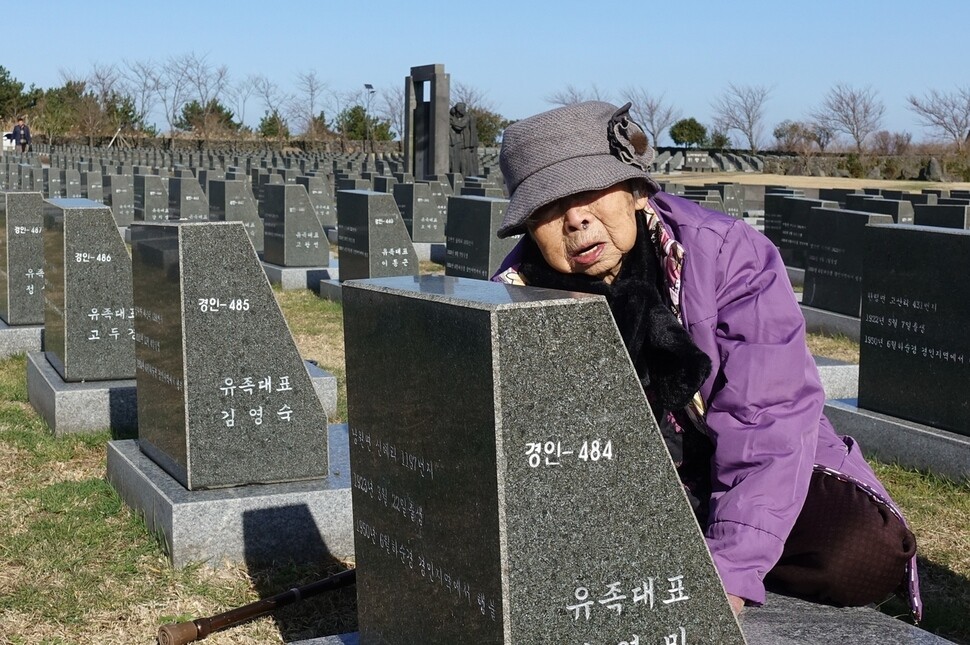
“It must be good to have so many friends.”
The old woman flopped down and stroked her husband’s tombstone. At the age of 97, her skin was deeply wrinkled, with tears visible in her eyes. On Nov. 23, Lee Im-gyu visited Jeju April 3 Peace Park in the Bonggae neighborhood of Jeju City, assisted by her daughter and grandchild. Lee, a resident of the village of Sillye in Seogwipo, was there for the first time since gravestones were put in place for the missing victims of massacres in the wake of the Jeju Uprising.
Lee seemed to have worried that her husband would have been lonely departing this earth before her. Caressing his tombstone, she repeated the words: “It must be good to have friends.” Her eyes were turned toward the rows of countless gray tombstones.
“Why are there so many people who died?” she asked daughter Jeong Yeong-soon, 70. “There are so many gravestones. My God.”
“I know. A lot of innocent people died,” Jeong replied. “It’s just good that there are people who survived.”
Lee described her husband to Jeong, who has no memory of her father.
“He was tall and had a nice face,” she said. There was a wistfulness to the conversation – between a woman who lost her husband as a 27-year-old with child, and the daughter born after his death.
The name on the tombstone read “Jeong Won-jong.” Lee’s husband had been the same age as her. They did not register the wedding. They lived together for a year and a half before that day when the then 27-year-old Jeong left the house, promising to “be right back” – and never returned for the rest of Lee’s nearly hundred-year life. A brief encounter, an eternal farewell.
Over time, Lee has forgotten the exact date, but her memories of “that day” are crystal clear.
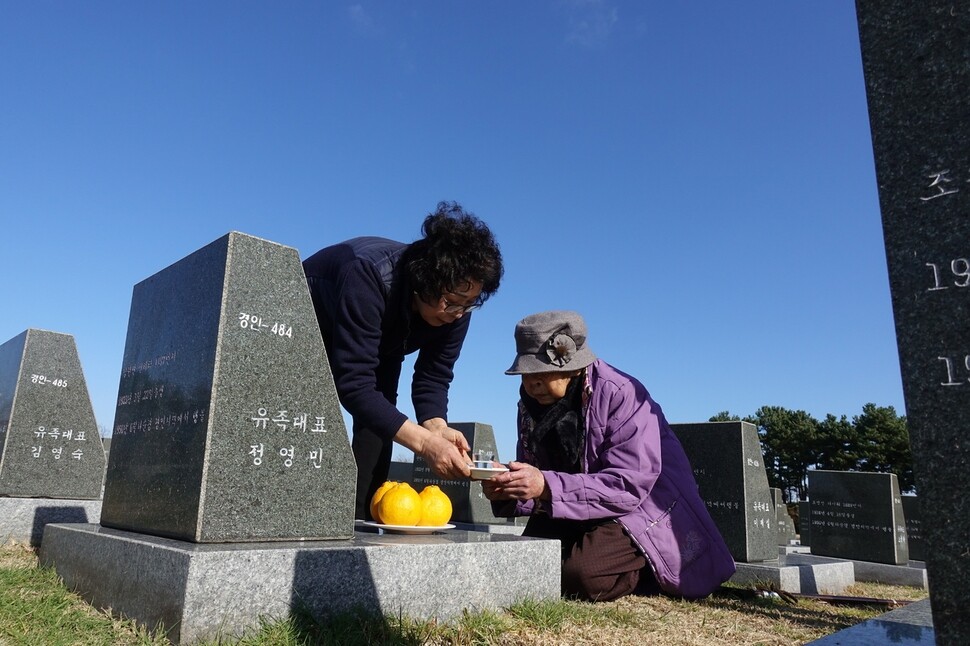
“I was in bed that night just trying to fall asleep, and someone came up the walkway and called out, ‘Is Won-jong there?’ I was just about to fall asleep, and my husband got up and went out to the yard. ‘Where are you going? Don’t leave,’ I called out to him, but he just said, ‘I’ll be back.’ So I expected him to come back, but that was it.”
It was a cold night. It happened around 10 pm sometime around Dec. 1948 – the eleventh month of the lunar calendar. She went onto the walkway after her husband, but he was already out of sight. The 27-year-old had been dragged off into the darkness. Lee was unable to sleep that night. Her husband never came home again.
“I just thought he’d be back. How could I have imagined he’d been taken away like that?” It was only after two days had passed that Lee suspected someone had captured her husband.
Most residents of Sillye Village at the time engaged in dry-field farming. Surviving from day to day was difficult, as in other places on Jeju Island. Lee’s husband and grandmother mainly grew barley and millet.
It was a heart-wrenching time. A few days after Lee’s husband was taken away, she heard from another resident that he had been seen in Gongcheonpo, a coastal village near Sillye. He had apparently been injured, as he had a towel wrapped around his head; his clothes were reportedly the same ones he had been wearing when he rushed out of the house that night. The punitive anti-communist forces kept Jeong and other residents in Gongcheonpo temporarily before transporting them to an internment camp set up at a potato warehouse next to Seogwipo Elementary School.
Potato, button, and starch warehouses in Seogwipo were being used for internment at the time; brutal torture took place on a daily basis. While there, Jeong had tried to contact his wife, passing along the message that he “wanted to see her.” Lee said she decided not to go, fearful that her heart might be shaken more than she could handle. “So what if he wanted to see me? I didn’t go because I was worried he would blame me,” she said.
Lee finally went to the potato warehouse camp. From a distance, she locked eyes with her husband. As if realizing the fate that lay in store, the 27-year-old husband and wife merely looked at each other wordlessly before parting. It was Lee’s last image of her husband; she was never able to see him again afterwards.
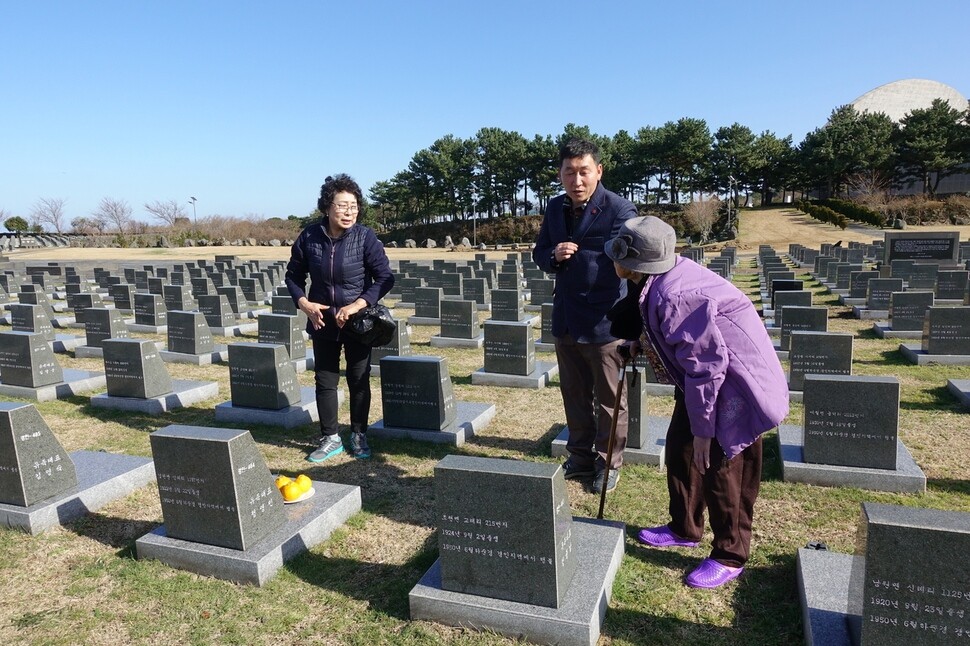
”Trials” for young people before their imprisonment
Jeong was relocated once again, this time to Jeju Township. Young people taken to the township were typically kept at the Jeju distillery before being given “trials” and sent off to prisons in other regions on mainland Korea. According to prisoner records acquired in 1999 by then-National Congress for New Politics lawmaker Choo Mi-ae from the National Archives, Lee’s husband was sentenced to life in prison by court-martial and incarcerated at Mapo Detention Center in Seoul. The record also said Jeong had proclaimed his innocence, but that his claims were rejected.
Lee’s father-in-law, who had been the village leader during the Japanese occupation, traveled to Seoul to meet with Jeong. The Korean War subsequently broke out, and when he went for a second-meeting, Jeong was nowhere to be found. Instead, there were merely numerous rumors of his death. Today, Lee and her family hold memorial ceremonies every year on Jeong’s birthday.
It was Jan. 27, 1949, the year after Lee’s husband was taken away. She and mother-in-law Kim Ryeo-yoon, then 48, were digging holes for potatoes in their yard when they were accosted by three or four young men holding bamboo spears. They are believed to have been students with the National Unified Students’ League. Lee, her five-year-old daughter, and her mother-in-law were dragged off to a small beachside house at Gongcheonpo as “relatives of a fugitive.”
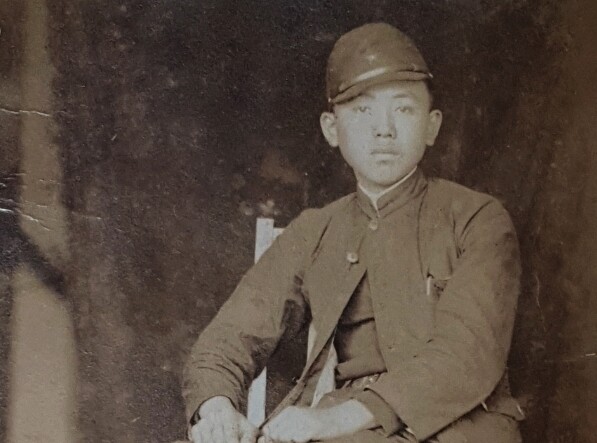
The young men kept Lee and her daughter in one room and Kim in the other. On Feb. 5, they had Kim leave her room and follow a path to the east. “Why are you taking my mother away?” Lee pleaded, but to no avail. As if foreseeing her own fate, Kim told her daughter-in-law, “Just stay alive. Take care of that child and live well.” Lee wept as her mother-in-law left the house, but there was nothing she could do. Soon afterwards, the young men took Kim to a roadside and killed her, covering her body with a sack. The family members went out to retrieve her remains.
“My mother-in-law was such a wonderful person. It’s so sad the way she died,” Lee recalled.
According to a report submitted ahead of a National Assembly investigation into the massacre of innocent civilians soon after the Apr. 19 revolution of 1960, Lee’s brother-in-law Jeong Paeng-jong demanded stern punishment for the killers of his mother and brother, clearing of their names, and compensation for their deaths.
Lee’s husband had been unaware of her pregnancy when he was taken away. She attempted to abort the child, but was unsuccessful.
“How could I ask my daughter to survive without a father? I had heard that if you boiled pine pollen in half a bowl of water and drank it, you would immediately miscarry,” she said.
“So one day when all the other people I lived with had gone out, I snuck into someone’s pine grove and gathered pollen. I drank it down quickly, and I even fell from the roof of the house, but I didn’t miscarry.”
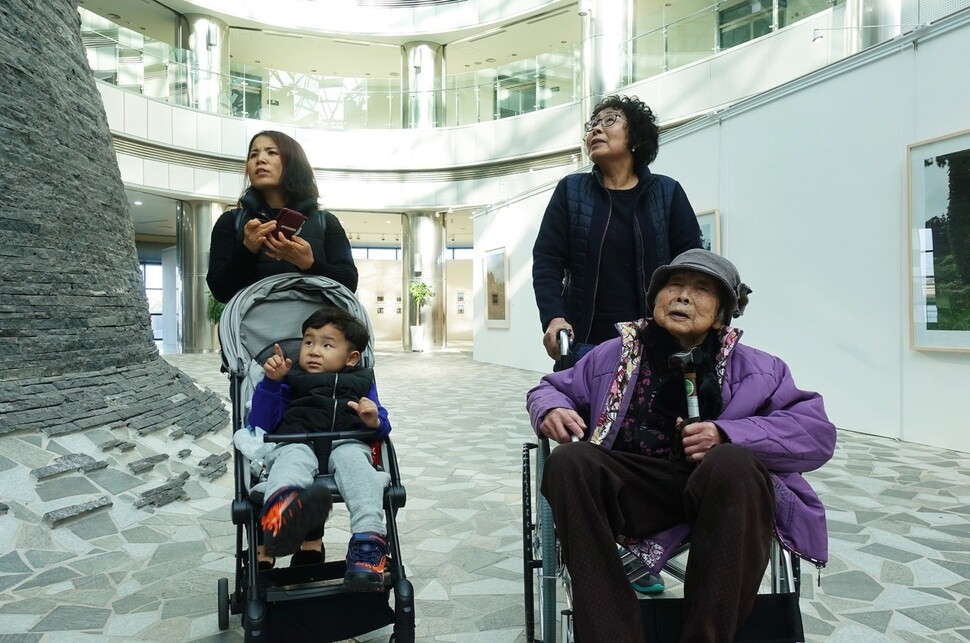
Jeong Yeong-soon smiled as she listened to her mother. The daughter Lee had been unable to abort was born the same month that her father was taken to Mapo Detention Center in Seoul. For much of her life, Jeong only heard that her father had died during the events of Apr. 3; the specifics of the story only began emerging when Jeju April 3 Peace Park was built in 2008.
“My father wasn’t there, so we lived in a rented room in someone else’s house, and my mother and I really struggled,” Jeong recalled. As an elementary school student, she would join her mother in collecting firewood on the mountain; early the next morning, they would chop it up and carry it to Soldongsan in Seogwipo to sell.
“I’ve struggled a lot in life, and so has my mother. Now even if I tell her to wear some nice clothes, she can’t part with her old ones because of how tough her life has been,” Jeong said. “It’s become second nature. We fight every day.”
On her family registry, Jeong is listed as the daughter of her uncle, as there is no record of her parents’ marriage.
“Even though my father died during the events of Apr. 3 Jeju Massacre, I was not named as a surviving family member,” she said. “I had no reason to have a family registry issued, so I had no idea.” It was only decades later that her mother had a registry made to include her adopted child; because of the complex legal procedures involved, Jeong is still listed as her uncle’s daughter.
“It’s outrageous. Even now, I’m not treated as a surviving family member when I come to the park, even though I’m really my father’s daughter. It’s just infuriating.”
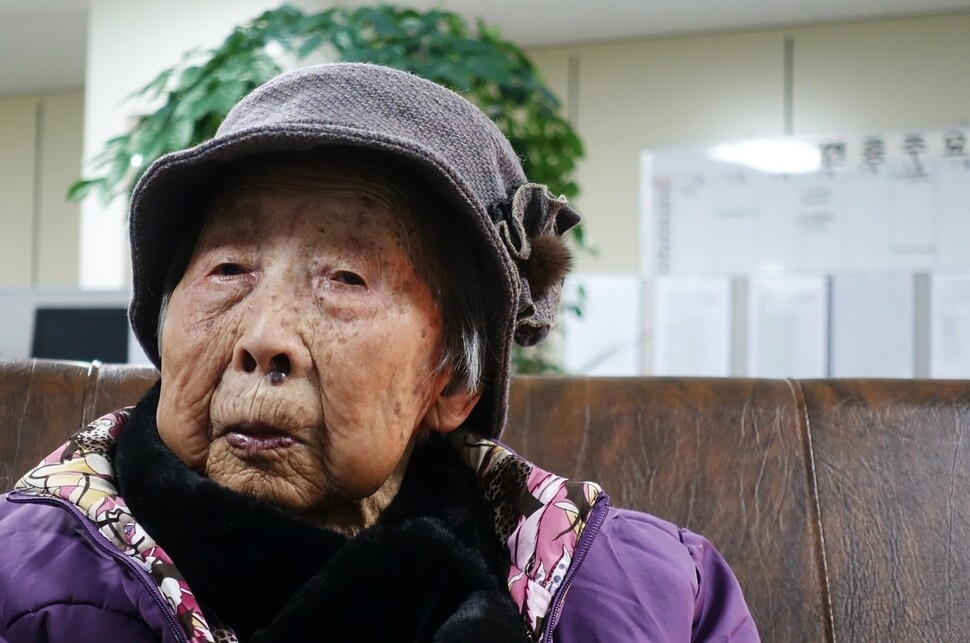
Jeong’s son, 47-year-old Yang Si-yeong, has observed his family’s history with the Apr. 3 Jeju Massacre while working for the past three years as secretary-general of the Association for the Bereaved Families of Apr. 3 Victims.
“Just to prove that my mother is my grandfather’s child, we would have to allow my grandmother and mother to be genetically tested. I feel very bad about not having done that yet,” he said.
“I’d like to call my father by his name – to see his face just once,” said Jeong. “That’s my wish. I also sometimes think he may still be alive somewhere.”
Hearing her daughter’s words, Lee spoke in a hushed voice.
“I think about him every day.” she said. “If he had lived, I’d been able to work and making a living with him and be together. Why did he have to die?”
By Huh Ho-joon, Jeju correspondent
Please direct comments or questions to [english@hani.co.kr]

Editorial・opinion
![[Column] Park Geun-hye déjà vu in Yoon Suk-yeol [Column] Park Geun-hye déjà vu in Yoon Suk-yeol](https://flexible.img.hani.co.kr/flexible/normal/500/300/imgdb/original/2024/0424/651713945113788.jpg) [Column] Park Geun-hye déjà vu in Yoon Suk-yeol
[Column] Park Geun-hye déjà vu in Yoon Suk-yeol![[Editorial] New weight of N. Korea’s nuclear threats makes dialogue all the more urgent [Editorial] New weight of N. Korea’s nuclear threats makes dialogue all the more urgent](https://flexible.img.hani.co.kr/flexible/normal/500/300/imgdb/original/2024/0424/7317139454662664.jpg) [Editorial] New weight of N. Korea’s nuclear threats makes dialogue all the more urgent
[Editorial] New weight of N. Korea’s nuclear threats makes dialogue all the more urgent- [Guest essay] The real reason Korea’s new right wants to dub Rhee a founding father
- [Column] ‘Choson’: Is it time we start referring to N. Korea in its own terms?
- [Editorial] Japan’s rewriting of history with Korea has gone too far
- [Column] The president’s questionable capacity for dialogue
- [Column] Are chaebol firms just pizza pies for families to divvy up as they please?
- [Column] Has Korea, too, crossed the Rubicon on China?
- [Correspondent’s column] In Japan’s alliance with US, echoes of its past alliances with UK
- [Editorial] Does Yoon think the Korean public is wrong?
Most viewed articles
- 1‘We must say no’: Seoul defense chief on Korean, USFK involvement in hypothetical Taiwan crisis
- 2N. Korean delegation’s trip to Iran shows how Pyongyang is leveraging ties with Moscow
- 3[Column] Park Geun-hye déjà vu in Yoon Suk-yeol
- 4Amnesty notes ‘erosion’ of freedom of expression in Korea in annual human rights report
- 5‘Weddingflation’ breaks the bank for Korean couples-to-be
- 646% of cases of violence against women in Korea perpetrated by intimate partner, study finds
- 7[Reportage] On US campuses, student risk arrest as they call for divestment from Israel
- 8“Parental care contracts” increasingly common in South Korea
- 9[Interview] Dear Korean men, It’s OK to admit you’re not always strong
- 10Korean government’s compromise plan for medical reform swiftly rejected by doctors